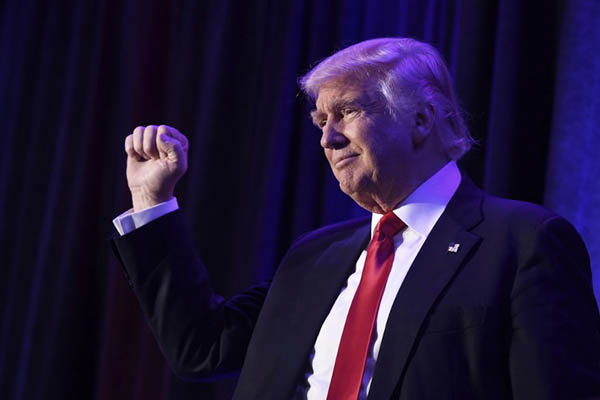
Saul Loeb—AFP
As estimated 800,000 people expected to attend oath-taking as demonstrations in several cities proclaim him ‘illegitimate.’
Donald Trump will be sworn in as the 45th president of the United States on Friday—capping his improbable journey to the White House and beginning a four-year term that promises to shake up Washington and the world.
An estimated 800,000 people will gather on the National Mall in the center of the nation’s capital to celebrate a man whose short 19-month political career has defied all predictions, and many norms.
When Trump descended the escalators of his glitzy New York tower in June 2015, his candidature was dismissed and even mocked. But shortly before mid-day Friday, Trump will place his hand on Abraham Lincoln’s bible, recite the oath of office on the steps of the Capitol and become the most powerful man on earth.
In the primaries, he dominated a crowded Republican presidential field with bareknuckle rhetoric and star power. He rode that same wave of anti-elite sentiment to victory over Democrat Hillary Clinton in the November election.
At 70 years of age, he is the oldest man ever to begin work in the Oval Office. But the real estate mogul and onetime television reality star is also a political neophyte—he will be the first president never to have held elected office, served in the government or the armed forces.
For his supporters, like Jake, a Californian who traveled to Washington for the inauguration, that is a central part of Trump’s appeal. “It honestly feels like we won the American Revolution again,” he said. “I really feel like we’ve taken back our culture, we’ve taken back our country. We’ve really been under attack from a lot of the establishment on both sides of the aisle—we’ve been under attack from the media, from the celebrities.”
The change in Washington—in many ways a company town—was already palpable late Thursday when Trump bopped along to country music during a pre-inaugural concert at the foot of the Lincoln Memorial. The music popular in America’s heartland had replaced the strains of Beyonce and Bruce Springsteen that marked Barack Obama’s two terms at the White House.
For his critics, Trump’s arrival in Washington on Thursday onboard an Air Force jet was more like a hostile takeover than a traditional changing of the guard. Small demonstrations popped up across the city center declaring Trump illegitimate and much larger rally is planned for Saturday.
Trump enters office with a 37 percent approval rating, the lowest on record, according to a CBS News poll. As Obama’s White House staff cleaned out their desks and the normally busy corridors of the West Wing fell quiet, many staffers expressed relief at the prospect of rest, but foreboding about the road ahead.
That sentiment is echoed across many of the world’s capitals. Trump has vowed to tear up Obama’s policies and re-examine decades-old alliances with Europe and in Asia. One of Obama’s last acts in office was to speak to German Chancellor Angela Merkel, and declare trans-Atlantic ties vital for world order—a statement that would have been a banal platitude before this rocky transition.
Still, Obama has one more part to play, hosting Trump and his wife Melania in the Blue Room of the White House for morning tea on Friday. The two presidents and their families will then travel the 2.5 miles down Pennsylvania Avenue to the swearing-in ceremony at the Capitol.
After promising to “faithfully execute the office of president of the United States” and “preserve, protect and defend the Constitution of the United States,” Trump will deliver the most important speech of his life.
Inaugural addresses—from Lincoln to John F. Kennedy—echo across American history. Phrases like “malice towards none” and “ask not what your country can do for you” have been seared into the vernacular.
The most noted inaugural addresses had sought to lift Americans’ gaze up from the rancor and troubles of the day toward the horizon and a better tomorrow.
Trump aides are promising an address that is at once short—at around 20 minutes—and philosophical. “It’s going to be a very personal and sincere statement about his vision for the country,” said incoming White House press secretary Sean Spicer. “He will discuss what it means to be an American, the challenges that we face, as members of the middle class, that they face,” he said. “I think it’s going to be less of an agenda and more of a philosophical document, a vision of where he sees the country, the proper role of government, the role of citizens.”
In brief remarks on the eve of becoming president, Trump vowed to bring unity, but there was also a rallying cry for his base. “We’re going to unify our country,” he said, before telling supporters: “You’re not forgotten anymore. We’re going to get our jobs back. We’re not going to let other countries take our jobs any longer. We’re going to build up our great military.”
After his speech, Trump will attend a luncheon inside the Capitol, before heading back to the White House to begin the business of governing.
